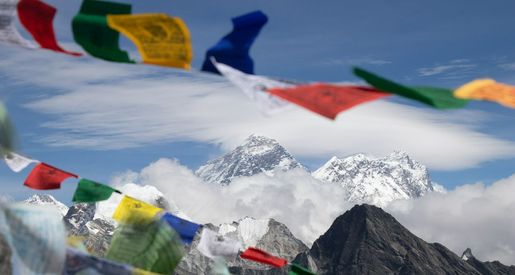- Details
- Category: Knowledge Centre
Mental Prep for an Everest Base Camp trek
Mental preparation for a trekking expedition like an Everest Base Camp Trek is just as important as the physical training. Often the mental hurdles of the mountains can be just as intimidating and overwhelming as the physical challenges.
You’ll want to have some strategies to rely on when the trek gets difficult and you can use your training to figure out what works to keep you mentally engaged and focused during the trek.
Below are a few ideas I’ve put together that should help you get prepared for an upcoming trip:
Break It Up into sections
Instead of viewing the trek as single massive undertaking, break the trip into sections, and sub-sections, and sub-sections of sub-sections. If base camp day is still days or even weeks away, don’t focus on it on the first time you put on your rucksack. Instead, break the trip in smaller portions: arriving into busy Kathmandu, flying on a scary flight to Lukla, reaching 5000m for the first time etc. Then segment out the day’s trekking into sections and concentrate on just the stretch you’re on. It’s easy to become overwhelmed by the enormity of the trek ahead but by breaking the trip down into smaller sections you can separate it out into achievable parts.
Focus on the here and Now!
Much like trekking in time, try focusing on the immediate trail ahead and don’t go through the exhausting mental exercises of “what-if”, “maybe”, or “perhaps” of what is over the horizon. Instead of worrying about how intimidating the 150meter drop is over a bridge or heading over a crevasse crossing on Island Peak that you heard other climbers/trekkers mention might be, what the altitude will feel like, how long the descent is going to be, or any other number of possibilities, focus on the route in front of you. By staying focused you won’t burn mental energy exploring unknowns and you’ll stay engaged. When you get to those times of the trek or places on the route, you may just find that they are far more manageable than you led yourself to believe.
Pick a target
When the going gets really tough and the trail gets steep, especially at high altitude, try picking a target in front of you. Many climbers descend from the mountains whilst putting their heads down concentrating on a rock or ledge in front and take a small rest when reaching this target. The same can be said whilst trekking. Try and pick a tree or rock before you take your next rest and the next thing you know you will be at the top of the hill with a cup of warm tea. Counting also helps. Try counting a certain number of steps - 20, 50, 100 - before looking up again. Don’t lose focus of what you’re doing and continue to climb & walk safely and in tandem with your team, but picking a target or counting is another way to give yourself something immediate to focus on to help get through the challenging sections of a days trek.
Let it go - Wander
On most long days of trekking or climbing, there are many moments such as the approach to a high pass or a descent where you’re close to a sheer drop off of the mountain that requires active focus and you’re simply walking up or down a trail. It’s okay to let your mind wander! Stay engaged with what you’re doing so you don’t stumble, but let your mind think about things other than the trail ahead. Maybe it’s thinking about how to plant the garden, remembering quotes from your favourite movie, solving a nagging problem, or even what meal you’ll treat yourself to after the trip finishes - anything that can give you a little mental escape.
Every trekker has different mental strategies that work for them. The trick is finding what works for you. Whether it’s a long weekend hike or a tough interval gym session, you can use your training routine to experiment with different ways of keeping yourself mentally engaged, even when the going get’s tough.
Enjoy it, take in the amazing views and most importantly stay positive!!! Most challenges in the mountains can be overcome by accepting where you are, dealing with it and having a positive mindset. Try and remember why you went on that trip in the first place. What you are doing the trip for. How long have you waited for this experience. These things really help.
Then when the trip is over and your back home, you will sit down and realise that you have achieved something amazing, something that you will remember for the rest of your life.
Previous Articles
- How to Train for the Everest Base Camp Trek
- How high is Everest Base Camp?
- How much spending money do you need for the Everest Base Camp trek
- What's the accommodation like on an Everest Base Camp trek
- Are showers available on the Everest Base Camp trek?
- What type of toilets are available on an Everest Base Camp Trek






